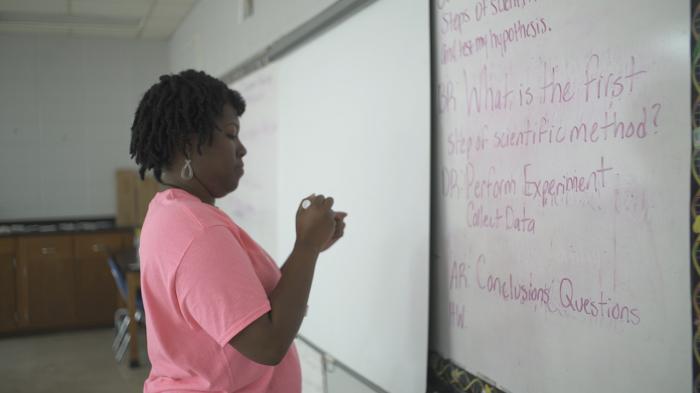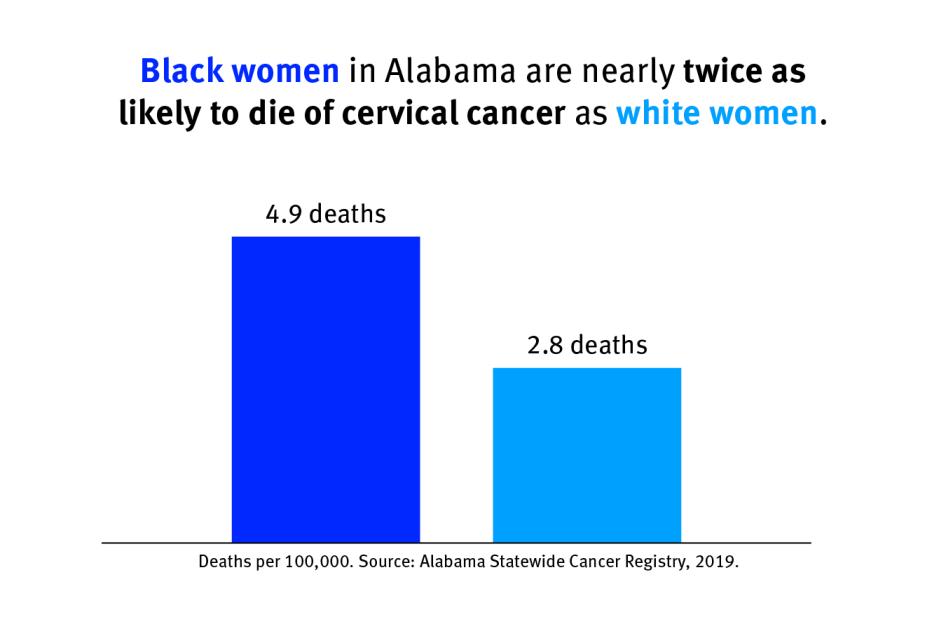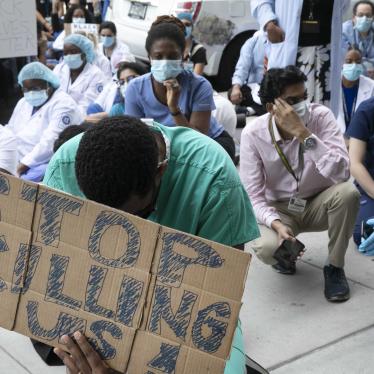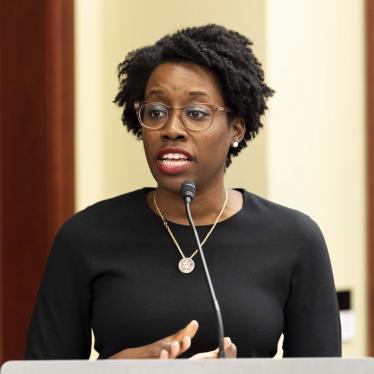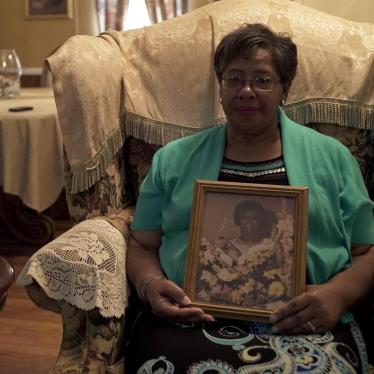(Washington, DC) – Alabama is failing to enact policies to improve health outcomes for its young people, Human Rights Watch said in a report released today. Despite the positive impact adolescent vaccines and sexual health education can have on improving health outcomes in the United States, state policies restrict access to information on sexual and reproductive health, leaving many young people unprepared to lower their health risks throughout their lives.
The 65-page report, “‘It Wasn’t Really Safety, It Was Shame’: Young People, Sexual Health Education, and HPV in Alabama,” documents the Alabama state government’s failure to provide young people with comprehensive, inclusive, and accurate information on sexual and reproductive health. Human Rights Watch also found that the state is not addressing barriers to the human papillomavirus (HPV) vaccine – an effective tool to prevent several types of cancer – and that vaccination rates throughout Alabama remain low.
“Young people need access to accurate information on their sexual health to build healthy relationships and make informed and safe decisions,” said Annerieke Daniel, women’s rights fellow at Human Rights Watch and author of the report. “Alabama can significantly improve health outcomes and possibly wipe out cervical cancer for future generations by guaranteeing comprehensive sexual health education in schools and increasing HPV vaccination rates.”
At a time when the United States is focused on health equity, the Alabama State Department of Education is enacting a new five-year strategic plan to reform the education system. Alabama has a unique opportunity to address historic inequalities and prioritize the long-term health and well-being of all young people. Any plan to increase student achievement and success should guarantee comprehensive sexual health education for all adolescents.
Earlier Human Rights Watch research detailed state policies that create a significant gap in protecting Alabama’s women from dying prematurely and addressing persisting racial disparities in health outcomes in the state. From May 2019 to January 2020, Human Rights Watch interviewed 113 people for the new report, including 45 between the ages of 14 and 26 who shared their experiences of sexual health education in 16 Alabama counties.
Alabama has high rates of sexually transmitted infections and of cancers associated with HPV, including cervical cancer, a highly preventable and treatable disease. According to the latest data available from the US Centers for Disease Control and Prevention, in 2017, Alabama was among the top five US states with the highest rates of cervical cancer cases and deaths. Black women in Alabama are nearly twice as likely to die of the disease as white women.
Alabama does not require teaching sexual health education in schools, but for schools that do, the Alabama State Code requires a focus on abstinence. Abstinence-focused education programs withhold critical, scientifically accurate information that young people need to make safer decisions to protect their health and instead often shame adolescent sexuality, with harmful consequences. The State Code also contains stigmatizing language around same-sex activity and prohibits schools from teaching lessons about sexual health in ways that affirm lesbian, gay, bisexual, and transgender (LGBT) youth.
Ashley W., who identifies as gay, said: “Every message that I ever got about sex, relationships, sexual health has all been wrapped in shame.” She said that “it has carried with me into my adulthood and it’s something I am continuously trying to shake.” At age 22, Ashley still has not been to see a gynecologist, which she partly attributes to the shame she felt around her sexuality growing up.
Misunderstandings among educators about the sexual health content teachers are permitted to teach, as well as inadequate teacher training on the topic, further limit the effectiveness of sexual health education in Alabama. Some schools, especially in rural and less wealthy areas, cannot afford to teach sexual health. The resulting unequal access to information can create lifelong disadvantages for some students, particularly those who are Black and live in poverty, and may contribute to racial disparities in health outcomes as they enter adulthood.
Alabama is also failing to invest in a proven effective cancer prevention tool – the HPV vaccine. Vaccination rates in Alabama are below the national average, leaving many youth unprotected against most of the strains of HPV that can lead to cancer. Very few young people learn in school about HPV, the vaccine, and how they can protect themselves from the virus. Misconceptions among parents and stigma because HPV is associated with sexual activity contribute to low vaccination rates.
Alabama should enact legislation mandating comprehensive sexual health education in all primary and secondary schools that is age-appropriate, scientifically and medically accurate, rights-based, and inclusive of all young people, Human Rights Watch said. Alabama should also allocate funding for community-based initiatives to ensure information on sexual health reaches young people who are out of school, adopt clear policies that facilitate education around HPV, and address additional barriers that contribute to low HPV vaccination rates.
The Covid-19 pandemic has brought to the fore Alabama’s racial disparities in health, with Black Alabamians significantly more likely to die from the virus than white people in the state. It has exposed structural inequalities and state failures to invest in everyone’s health and rights, including people in low-income and marginalized communities. The pandemic has also brought attention to the importance of ensuring that everyone has the information and resources they need to make informed decisions and take steps to safeguard their health.
“By investing in young people, Alabama’s government could reverse the trend of poor health outcomes that plague the state after years of discriminatory neglect,” Daniel said. “Comprehensive sexual health education in schools can lay a solid foundation for all young people to thrive as healthy and informed adults.
Selected accounts from the report:
Monique S. (pseudonym), 22:
Monique S. said that the sex education she received in high school “was actively harmful and not at all useful or valid information.” Guest speakers who were brought into her 9th grade health class used harmful metaphors and shameful language around sex. They also showed graphic photos of sexually transmitted infections, which she described as a doomsday scenario: “This is gonorrhea. This is chlamydia. This is what it looks like on your genitals and face and stuff. And here are your chances of getting it if you have sex even once.” Beyond abstinence, Monique and her peers were not provided with any information on how to prevent these infections or how to protect themselves and stay healthy into adulthood. She said the education she received on sexual health “wasn’t about providing accurate information. It was about scaring people.”
Joan A. (pseudonym), 21:
Joan A. said that abstinence was always preached in school, especially to young girls, and she was never educated on protecting herself or having conversations with sexual partners about protection. Although she left for college believing she would wait until marriage to have sex, she ended up having unprotected sex with one person and contracted trichomoniasis, a common and treatable infection. She said that, “I didn’t have my own protection but I expected him to and he didn’t.” Although she felt she should not have unprotected sex, Joan lacked not only the confidence to say no to her partner, but also an understanding of steps she could have taken to protect herself in that situation.
Ariel G., 23:
Although she was sexually active in high school, Ariel G. said that she didn’t feel comfortable seeking out information or resources on her sexual health due to her feelings of shame:
It [sex] was like seen as something so bad so I never felt like I wanted to speak up about it. Or if I wanted help, I never felt like I could reach out because I was already seen as a criminal for having sex. So it makes it more like a kind of thing to be done in secrecy.
Patricia E. (pseudonym), 25:
Patricia E. said that the primary care doctors she saw as an adolescent in Marengo County did not recommend the HPV vaccine. She first heard about it when she saw a commercial on television when she was 17, but it was not until years later that she learned about the role the vaccine plays in preventing cancer: “I didn’t even know until I was 22 that the HPV vaccine was a preventive measure against cervical cancer.”
